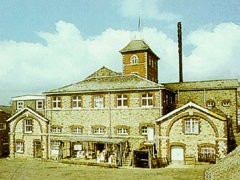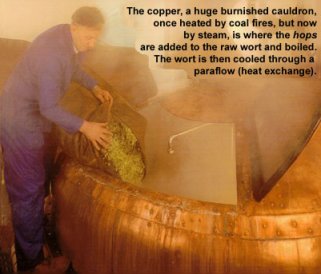 |
 |
|

|
|

|
 |
home
about
Protz
features
A-Z
books
|
|
Protz:
features
reviews
tastings
news & events
books
|

| |
St Austell brewery: all steamed up
by Willard Clarke, 02/05
It's a tough job being a regional brewer these days, doubly hard if you're in a part of the country where the population halves as the summer holidays end.
When I last visited St Austell Brewery in Cornwall more than 10 years ago, I was told "Beer sales fall off the cliff when the schools go back." It was said in a matter-of-fact, fatalistic manner. I got the
impression that St Austell was in slow, possibly terminal decline, surviving thanks to a substantial tied estate of around 150 pubs and a contract to supply Carlsberg products in the West Country. |
|

|
The brewery's difficulties were made worse by the arrival of Sharp's and Skinner's, two thrusting micros that quickly started to make substantial amounts of beer. Sharp's in particular grew rapidly to become more of a small
regional than a minnow.
But St Austell fought back. It has seen a revival in its fortunes thanks to a change of generations in 2000. The new, young managing director James Staughton is the great-great-grandson of Walter Hicks who
founded the brewery in 1851. James has a quiet but profound belief in the company and he had the good luck to be joined by a young head brewer, Roger Ryman, who is passionate about cask beer and is
determined to fill and overflow his mash tuns and fermenters.
They have been surprisingly but pleasingly successful. When Roger Ryman took over, the brewery was making 15,000 barrels of beer a year. That figure has been boosted to 25,000 barrels and Roger's ambition is to reach 35,000. That would be more than the peak of 30,000 in the 1970s, but the emphasis then was on keg beer and today St Austell is based solidly on cask
When the brewery was launched in the 19th century it had a thirsty base of tin miners, china clay workers and fishermen to supply. Holidaymakers were a useful add-on but were not essential to success.
Today traditional industries have gone and fishing is in steep decline. Visitors to Cornwall have increased in importance, providing a vital lifeline of cash to pubs and brewery.
But James and Roger knew they had to break out of a peaks-and-troughs cycle that saw 900 barrels a week being brewed in summer and just 250 a week in January.
They had the good fortune to win the Tesco Beer Challenge with Clouded Yellow, a new bottle-fermented beer made with the addition of wheat, coriander and vanilla to a malt and hops base. As a result, Clouded Yellow is available nationally through Tesco and now also has a listing with Asda.
The company is building on that success by turning its bronze bitter, the 4.2% Tribute, into a beer available nationally through pub groups and the free trade. James and Roger are keen to emulate Adnams, which has broken out of its Suffolk base, where half its potential trading area is the North Sea, and now enjoys a national presence with its cask beers.

|
|
You don't have to own a beautiful brewery to make good beer, but it helps. Behind St Austell's heavy stone walls are two magnificent wood-jacketed mash tuns.
One dates from the 1890s when Walter Hicks abandoned his first site to move to the present four acre premises in Trevarthian Road, the second from around the time of World War One.
There are two gleaming coppers, one of which dates from 1893. Both were once heated by steam and the site was known as a "steam brewery", a title also given to the now defunct Redruth Brewery. |
Brewing water or "liquor" comes from a natural underground reservoir at the back of what was once Walter Hicks's garden. The water is soft and is hardened or "Burtonised" with the addition of gypsum and Epsom salts to make it ideal for brewing bitter beers.
Fermentation takes place in 12 high-sided wooden vessels, with interiors now lined with plastic but which were originally made of slate.
Roger Ryman is a promiscuous brewer, using a wide range of malts and hops to achieve the aromas and flavours he seeks in his beers. Tribute, with its appealing bronze colour and rich flavours of biscuity malt, tangy hops and tart fruit, is brewed with 20% Munich malt, a grain more usually associated with the famous March beers of the Bavarian capital. The malt - renamed Cornish Gold -- is supplied by Tuckers in Newton Abbot and is roasted to a higher temperature than conventional pale malt.
Tribute is hopped with English Fuggles in the copper. Before the hopped wort is cooled for fermentation, it rests on a deep bed of Styrian Goldings in the hop back to pick up additional aroma and bitterness. James and Roger were basking in the warm glow of winning both the Best Bitter class and the overall Beer of the Festival award at CAMRA's Falmouth Beer Festival for Tribute.
Clouded Yellow started life as a trial brew in a two-barrel micro-plant in the heart of the brewery. It was first brewed for the annual Celtic Beer Festival held in the cellars at St Austell and was known as Hagar the Horrible. Just as well they changed that. Roger wanted to recreate a Bavarian wheat beer, a style renowned for its palate of vanilla and coriander, which comes from special yeast strains used in southern Germany.
Roger was reluctant to introduce a Bavarian yeast strain into his brewhouse in case it cross-pollinated with his house culture. He achieved the aromas and flavours he wanted by using coriander and vanilla pods in the brewing process. The beer I tasted on my visit seemed less full-bodied than in the past - the result of supermarket pressure? - but is nevertheless ripe, tangy and splendidly refreshing.
St Austell's long-standing beers remain, including the golden Tinners (3.7%) and the redoubtable 5% HSD. The letters stand for Hicks Special Draught but it's best
known by its West Country nickname of High Speed Diesel. Brewed with Maris Otter pale and crystal malts and hopped with Fuggles and Goldings, it has a big orange fruit aroma and palate balanced by resiny hops and
biscuity malt, with bitter hops, spices and tart fruit on the palate and finish. It's a belter by any name.
With a tied trade that straddles the Devon border, 1,000 employees in brewery, visitor centre, distribution and pubs, wholesaling for Carlsberg, and supplying the West Country with wines,
spirits and mineral waters, St Austell is a major force in the region. |
|

|
It has pinned its faith in cask beer, which accounts for 75% of production, a faith now paying a rich dividend. St Austell no longer teeters on the edge of the cliffs, surveying the rocks below.
St Austell Brewery
Shop, visitor centre and tours: 01726 66022
|
|
home
about
Protz
features
A-Z
books
|





